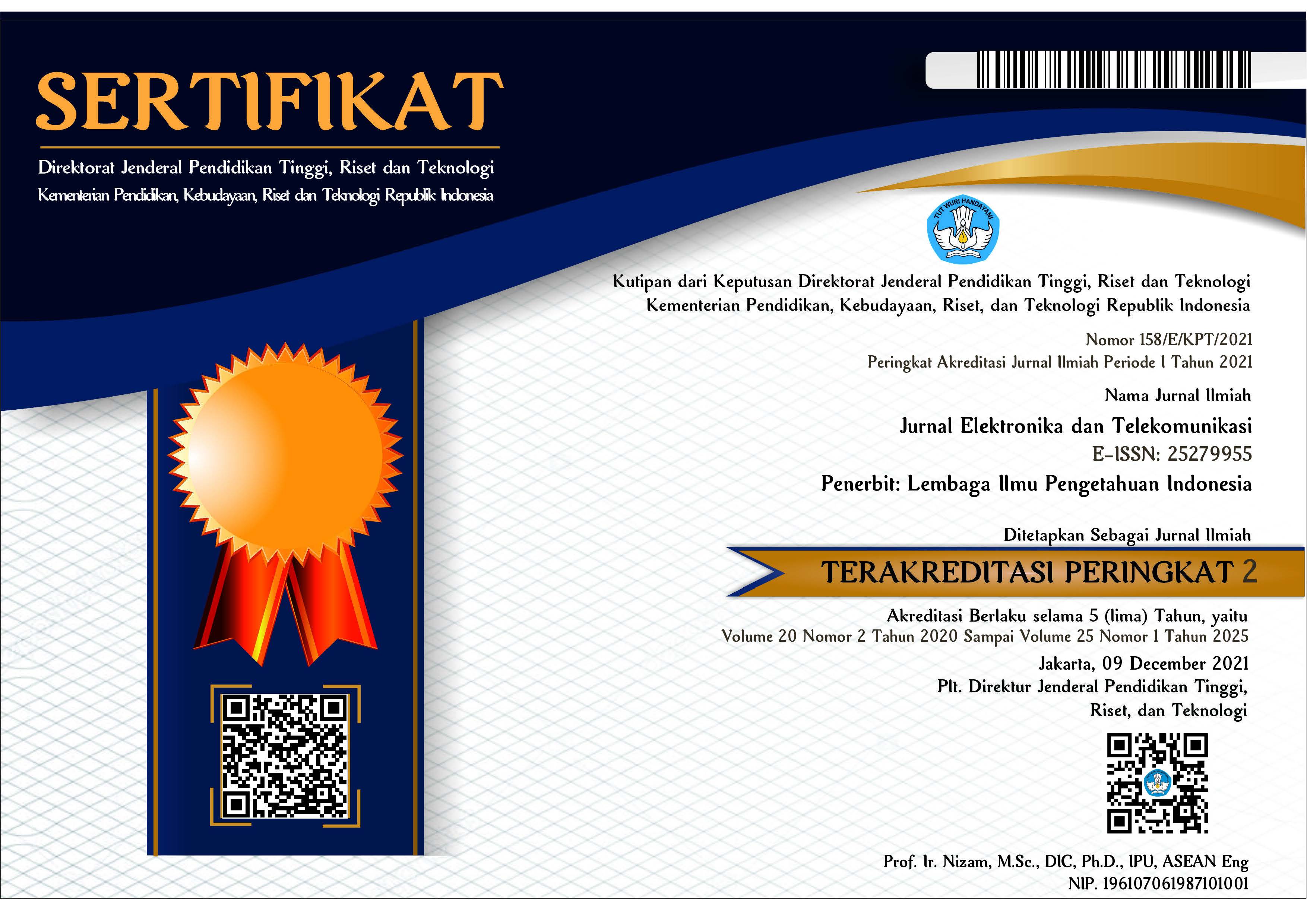BLDC Motor Control Optimization Using Optimal Adaptive PI Algorithm
Abstract
The main problem of using a Proportional Integral (PI) Controller in Brushless Direct Current (BLDC) motor speed control is tuning the PI’s parameter and its performance cannot adapt to the system behavior changes. Particle Swarm Optimization (PSO) has been chosen to optimize the tuning. Fuzzy Logic Controller (FLC) is used to online tuning PI’s parameters to adapt to system conditions. Optimal adaptive PI, which combines the PSO method and FLC method to tune PI, is proposed. It was successfully implemented in the simulation environment. The test was carried out in three conditions: step responses, set-point changes, and disturbance rejection. The proposed algorithm is superior with no overshoot/undershoot. Whereas in terms of settling time is in between PI and PI-PSO. PI controller has the smallest control effort. However, the other parameter is the worst. PI-PSO is superior in terms of settling time and Integral of Absolute Error (IAE) except for the step response test. The proposed method has lower IAE and higher control effort by 78.73 % and 60 % compared to PI control. On the other hand, it has a higher IAE dan lower control effort by 11.82 % and 33.88 % compared to PI-PSO. Therefore, the optimal adaptive PI control can reduce energy consumption compared to optimal PI with better performance than PI control.
Keywords
References
S. M. Rakhtala and E. S. Roudbari, “Application of PEM fuel cell for stand-alone based on a fuzzy PID control,” Bulletin Elect. Eng. Informatics, vol. 5, no. 1, pp. 45–61, 2016. Crossref
K. H. Ang, G. Chong, and Y. Li, “PID control system analysis, design, and technology,” IEEE Trans. Control Syst. Technol., vol. 13, no. 4, pp. 559–576, 2005. Crossref
A. Balestrino, A. Caiti, V. Calabró, E. Crisostomi, and A. Landi, “From basic to advanced PI controllers: a complexity vs. performance comparison,” in Advances in PID Control, UK: InTech, 2011, pp. 85–100. Crossref
A. Y. Jaen-cuellar, R. de J. Romero-Troncoso, L. Morales-velazquez, and R. A. Osornio-rios, “PID-Controller tuning optimization with genetic algorithms in servo systems,” Int. J. Adv. Robot. Syst., vol. 10, pp. 1–14, 2013. Crossref
J. M. Herrero, X. Blasco, M. Martinez, and J. V Salcedo, “Optimal PID tuning with genetic algorithms for non linear process models,” in 15th Triennial World Congr., 2002, pp. 31–36. Crossref
A. A. M. Zahir, S. S. N. Alhady, W. A. F. W. Othman, and M. F. Ahmad, “Genetic algorithm optimization of PID controller for brushed DC motor,” Intell. Manuf. Mechatron., pp. 427–437, 2018. Crossref
C. Lin, H. Jan, and N. Shieh, “GA-based multiobjective PID control for a linear brushless DC motor,” IEEE/ASME Trans. Mechatron., vol. 8, no. 1, pp. 56–65, 2003. Crossref
R. Arulmozhiyal and R. Kandiban, “Design of fuzzy PID controller for brushless DC motor,” in 2012 Int. Conf. Comput. Commun. Informat., 2012. Crossref
M. A. Ibrahim, A. K. Mahmood, and N. S. Sultan, “Optimal PID controller of a brushless DC motor using genetic algorithm,” Int. J. Power Electron. Drive Syst., vol. 10, no. 2, pp. 822–830, 2019. Crossref
L. Harnefors, S. E. Saarakkala, and M. Hinkkanen, “Speed control of electrical drives using classical control method,” IEEE Trans. Ind. Applicat., vol. 49, no. 2, pp. 889–898, 2013. Crossref
S. Lin and G. Wang, “Fuzzy PID control algorithm based on PSO and application in BLDC motor,” in 3rd Int. Conf. Advances Energy Environment Chemical Eng., 2017. Crossref
N. N. Baharudin and S. M. Ayob, “Brushless DC motor speed control using single input fuzzy PI controller,” Int. J. Power Electron. Drive Syst., vol. 9, no. 4, pp. 1952–1966, 2018. Crossref
A. Soundarrajan, S. Sumathi, and C. Sundar, “Particle swarm optimization based LFC and AVR of autonomous power generating system,” IAENG Int. J. Comput. Sci., vol. 37, no. 1, 2010.
M. E. El-Telbany, “Employing particle swarm optimizer and genetic algorithms for optimal tuning of PID controllers: a comparative study,” ICGST-ACSE J., vol. 7, no. 2, pp. 49–54, 2007.
C. Ko and C. Wu, “A PSO-Tuning method for design of fuzzy PID controllers,” J. Vibration Control, vol. 14, no. 3, pp.375-395, 2008. Crossref
E. Gowthaman, V. Vinodhini, M. Y. Hussain, S. K. Dhinakaran, and T. Sabarinathan, “Speed control of permanent magnet brushless DC motor using hybrid fuzzy proportional plus integral plus derivative controller,” in Energy Procedia, vol. 117, pp. 1101–1108, 2017. Crossref
S. K. Injeti and M. Divyavathi, “Optimal gain scheduling of PID controller for the speed control of PMSM drive using bio-inspired optimization algorithms,” Int. J. Elect. Eng. Informat., vol. 11, no. 2, pp. 308–325, 2019. Crossref
A. Maarif, H. Nabila, Iswanto, and O. Wahyunggoro, “Application of intelligent search algorithms in proportional-integral- derivative control of direct-current motor system,” J. Physics Conf. Series, vol. 1373, 2019. Crossref
U. K. Bansal and R. Narvey, “Speed control of DC motor using fuzzy PID controller,” Adv. Electron. Electr. Eng., vol. 3, no. 9, pp. 1209–1220, 2013.
C. Conker and M. K. Baltacioglu, “Fuzzy self-adaptive PID control technique for driving HHO dry cell systems,” Int. J. Hydrogen Energy, vol. 45, no. 49, pp. 26059-26069, 2020. Crossref
N. P. Ananthamoorthy and K. Baskaran, “High performance hybrid fuzzy PID controller for permanent magnet synchronous motor drive with minimum rule base,” J. Vibration Control, vol. 21, no. 1, pp. 181–194, 2013. Crossref
Article Metrics
Metrics powered by PLOS ALM
Refbacks
- There are currently no refbacks.
Copyright (c) 2020 National Research and Innovation Agency

This work is licensed under a Creative Commons Attribution-NonCommercial-ShareAlike 4.0 International License.























